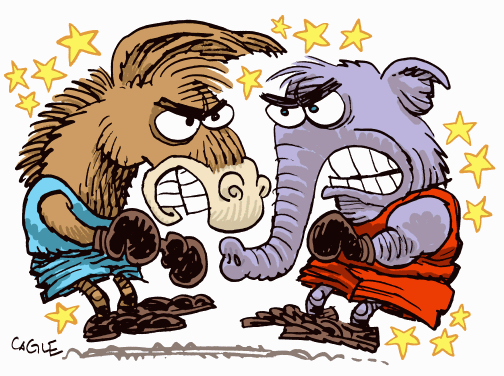
How Much Does the Popular Vote Matter?
By Thomas Hoffman
With the inauguration completed, we are witnessing an outbreak of protests across the country. Protesting the change in power is somewhat common with new presidents these days, especially when the new president did not win the popular vote. One subject that is destined to resurface is how this President did not, in fact, win the popular vote.
Candidates who win the popular vote rarely draw attention to that part of the victory. Al Gore did not mention it in his 2000 concession speech. Tim Kaine mentioned it but Hillary Clinton did not. The logic behind this strategy seems to be politicians do not want to divide the country more. However, the country is divided anyway.
A great line for a concession speech for someone who won the popular vote but lost the electoral vote would be “The people have spoken, but my opponent [who won the electoral vote] became president anyway.” It is always interesting how the person who loses the popular vote reacts. Many Trump supporters claim the popular vote is irrelevant. However, in 2012 there was a period of time when it looked like Romney would win the popular vote. If he had, it is doubtful so many conservatives would feel the popular vote is irrelevant. President Trump claims he would have won if it had been a popular vote election because that would have required a different strategy. He does make an interesting point. Trump did not win the popular vote because he and Hillary Clinton did not even try to win the popular vote. The election is based off the electoral vote, and winning the electoral vote does require a different strategy than winning the popular vote. However, that does not guarantee that if it was a popular vote election, Trump would have won. It is impossible for anyone to claim they would have won if the rules were different, unless you have a real election that enforces those rules.
As for now, we have both the electoral vote and a popular vote. Both sides are right to a certain degree. The popular vote is neither irrelevant or an example of who would win if the popular vote was the only vote that mattered. The popular vote is symbolic; nothing more, nothing less. Winning the popular vote does one thing and only one thing; it takes away from your opponent’s victory. Perhaps that is exactly what the founding fathers wanted. A way to weaken the “winning president” without winning the election.
When you win the popular vote but lose the electoral vote, it gives a candidate the right to gloat. It gives them the right to use the “the people have spoken but my opponent became president anyway” line. But the question remains, does it give you the right to re-write the constitution?
Thomas Hoffman is a graduate of Marymount Manhattan College. He majored in Communication Arts, with a Concentration in Professional and Promotional Communication. He has received several awards for writing in The Mortimer Levit Writing Contest.
















